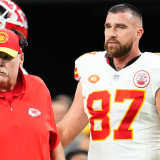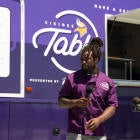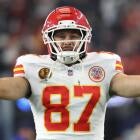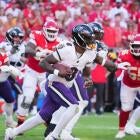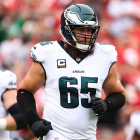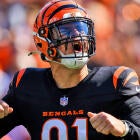Coronavirus: Carson Wentz, Dalvin Cook among NFL players using food trucks to fight hunger, unemployment
Inside the relief efforts of big names around the league during the COVID-19 pandemic
On a normal April day, food trucks supported by NFL players like Carson Wentz and Dalvin Cook would just be kicking their spring schedules into high gear. Nothing draws a crowd like a sizzling lunch wagon after a cold winter. In 2020, however, there's no such thing as a normal April day. The coronavirus (COVID-19) pandemic has disrupted society on a global scale. The United States is under a voluntary national shutdown, with restrictions on just about any kind of social gathering, through at least the end of the month. Sports have not been spared and, in fact, were one of the first major casualties: MLB, NBA, NHL, the Masters, March Madness, the Summer Olympics -- all postponed, shortened or outright canceled.
Food trucks, of course, are inherently social. They're literally built for customers on the go and out of the house. Wentz unveiled his foundation's vehicle, dubbed Thy Kingdom Crumb, in front of 25,000 Philadelphia Eagles fans during the quarterback's first annual charity softball game in 2018. The Crumb often sits outside Lincoln Financial Field on autumn Sundays, reaching hungry mouths by the masses. One thousand miles to the west, Cook and the Minnesota Vikings Foundation helped launch Vikings Table, a 38-foot custom Winnebago that made 25 stops and served more than 4,000 meals in its first six months of operation.
That kind of outreach is all fine and well. But during a pandemic? Not so much. A food truck operating during COVID-19's rapid spread across the country wouldn't just be violating state and federal guidelines. It would also, by nature of its business, be putting people at risk.
And yet neither Cook nor Wentz has advocated for their trucks to be locked away in the garage, sheltered from their target areas of Philadelphia and the Twin Cities -- two of the 20 most populous areas in the U.S. Instead, the two Pro Bowlers have helped to repurpose the programs for immediate pandemic relief. With the world, football included, indefinitely on hold, two of the biggest faces of their respective teams (and states) have come together -- not physically or even knowingly, but rather in spirit -- to fight hunger, unemployment and every unfortunate byproduct of one of this generation's most unsettling events.
"We can all provide something," says Cook.
'We wanted to get to them first'
The Vikings Table food truck, painted purple with a luxurious interior akin to the Vikings' state-of-the-art training facilities, was designed to serve traditional Twin Cities fare, like Juicy Lucy burgers, at everything from home games to city festivals to training camp in nearby Eagan. Its typical operation would've started April 1, with two stops per week and 100-200 hot meals served straight off the truck.
"When COVID started to become a much more pressing issue," says Vikings COO Andrew Miller, "we just happened to have a board meeting at the time, and someone raised the question, 'What else can we do with the food truck? How can we get it out in the community? With schools closing, with people losing their jobs, there's going to be so much more need.' And there's already such a big need in our world, with food insecurity."
Vikings Table proceeds were already set to provide free, biweekly meals to needy areas -- local schools, summer camps, enrichment centers. But once Gov. Tim Walz ordered the closure of all Minnesota schools to slow the spread of the virus, many children were left without one of the last consistent sources of food in their lives: school lunch.
Suddenly, those kids -- those same needy areas -- weren't just a focal point of the Vikings Table. They were the point.
With $10,000 in support from Cook and another $5,000 from the NFL Foundation, the truck quickly pivoted to a pre-packaged meal delivery system. The truck itself is still being used to prepare meals, which include sandwiches and a side of fruit and/or veggies, and then another smaller vehicle takes them directly to The Open Door, a nearby nonprofit pantry. From there, the meals are distributed -- 100 at a time, every weekday -- to hungry homes.

"The first meals we sent to Open Door, they were going to Emerald Hills, (a mobile-home park in a suburb of St. Paul) which is only eight minutes from our facility," says Monterae Carter, the Vikings' foundation programs coordinator. "They were not qualified for free school meals, so we wanted to get to them first. We're working with social workers in different school districts where bus routes aren't going to drop off school meals."
Among the next stops: The Link, a nearby nonprofit founded by former Vikings Jim Marshall and Oscar Reed, which supports North Minneapolis youth victimized by crime, poverty and social injustice.
Not only that but Vikings Table's chief operators, Tony and Haley Fritz, are using the employee pool from their two other businesses to hire out hourly workers during a time of record unemployment claims across the country. The Fritzes also own O'Cheeze, a gourmet grilled cheese food truck; and Dough Dough, an edible cookie dough shop at the Mall of America.
"It's very rare in our organization for everyone to have their hand in such a large project," says Carter.
Just a way to say, 'We love you'
Wentz's truck, named Thy Kingdom Crumb, was always geared toward service rather than business. Clad in a green color befitting of both the Eagles and Wentz's North Dakota State Bison, the truck has leveraged partnerships with local bakeries and markets to serve free meals to anyone and everyone in the Philly area -- as well as, occasionally, the QB's Midwestern stomping grounds.
"Out here on the East Coast, things escalated quickly with the virus," says Wentz's brother, Zach, the executive director of the QB's AO1 Foundation. "We wanted to respond, and we knew we had the resources to respond ... As soon as this started, Carson was involved with me every other day, trying to figure out what's a good solution. We had probably eight to 10 different ideas, and it changed every few days based off the recommendations -- no gatherings of 50 or more, then 10 or more, then having to wear face masks, then no interstate travel."
Ultimately, the Wentz brothers landed on a grocery delivery service. With food banks drying up and many families scrambling to reorient meal plans, Carson's AO1 Foundation contributed $100,000 to essentially transform Thy Kingdom Crumb's New Jersey home base, a converted restaurant, into a packing facility. Volunteers there fill bags with about $25 worth of donated items -- everything from apples to bread to pasta to peanut butter -- and then load them into a refrigerated box truck. The groceries are then delivered to partnering nonprofits and redistributed across the Philly and South Jersey area. ("There's no need for us to reinvent the wheel," Zach explains, "when so many nonprofits are already doing stuff like this. Our job is to get it in their hands.")

Three hundred and sixty bags went out on the operation's first day -- about $9,000 worth of food. Most of the bags went to Camden Public Schools, which is offering family meal pickups twice a week. Some went to the local hospital. Others reached the Camden Police Department.
"We needed to find a solution that got food into the public's hands but at the same time mitigated the risk for people, as well as our staff," says Zach. "It's designed to basically be a hug from us to them, saying 'We see you, we care about you, we love you.' It's not anything fancy, the grocery bags, but just a way to say, 'We love you.'"
Much like the food truck, the initiative is meant to help everyone, not just those with financial needs. For example, the foundation also wants to get food to those with a family member working at an essential business, like healthcare, during the pandemic. It's also planning to distribute various non-food items from its New Jersey facility, like toilet paper, paper towels, soap and hand sanitizer.
Different in motivation, united in service
Cook doesn't have to be talked into fighting food insecurity during this time. He grew up fighting it.
A sibling to six, his journey from South Florida is well documented. His grandmother, Betty, herself a sister to nine and raised by a single mother, worked at a food service distributor for more than 15 years. More than that, she's been hailed as a neighborhood saint for feeding and taking in all kinds of at-risk youth in the area -- including Dalvin. (Here's Miami Central High principal Gregory Bethune: "One of the things we always say is, 'We need to give thanks to God.' But after God is Betty Cook.")
Dalvin "ate a lot," his grandmother once joked, reflecting on a time long before Cook was a chiseled 210-pound NFL running back. But he watched, and learned, as his upbringing informed a future dedication to providing for people that don't have.
"Growing up with a lot of people in my household, the older people having to provide for the younger ones, sacrifices were made," Cook says. "It definitely affects the type of appreciation a person has. People can take it for granted. It can go unnoticed because it's 'just' a plate of food. You may wake up and be privileged to have it ... but as you get older, you appreciate those little things."
Brett Taber, executive director of the Vikings' Social Impact department, has seen Cook's personal compassion for the issue since well before the COVID-19 outbreak, saying he's "been committed to that cause since arriving in Minnesota."
Wentz doesn't have the same backstory. (Miami-Dade County, where Cook grew up, has about 33 times more people -- and at least twice as high of a crime rate -- than Burleigh County in North Dakota, the QB's high school stomping grounds.) His motivation instead stems from wanting to "demonstrate the love of God" by feeding all people both physically and spiritually. Tattooed with Bible verses, he's long championed his foundation as a way to model the unconditional servitude of true Christianity.
"Food is the means; Jesus is the end," his brother, Zach, explains, adding that every Thy Kingdom Crumb grocery bag includes a book about God's grace. "We hear stories daily about people who are essential employees who are having more spiritual conversations at work than ever before because of what's going on, now that so many people are questioning things."
What Wentz wants is to simply share the hope he has in Jesus -- a hope that goes beyond anything the world can offer, and yet at the same time is shared in tangible ways, like a bag full of groceries. While Cook and the Vikings may not be following that same playbook to a tee, their commitment to service at a time of need is the same.
"Those guys have a big platform," says Cook, "so I appreciate them doing that."
The NFL community steps up
Cook and Wentz are far from the only big NFL names putting in work during a strenuous time for the world.
Dallas Cowboys pass rusher Demarcus Lawrence organized a food truck pop-up for medical personnel in Dallas. New Orleans Saints QB Drew Brees and his wife, Brittany, donated $5 million to fund meal deliveries for kids and seniors in need. Jacksonville Jaguars running back Leonard Fournette is donating 56,000 meals over the next eight weeks. Eagles owner Jeffrey Lurie pledged $1 million to Penn Medicine for COVID-19 research. Backed by their Wilf family ownership, the Vikings doled out $500,000 to everything from Twin Cities Boys & Girls Clubs to the North Memorial Hospital. Dozens of Cook's teammates have done similar things: Adam Thielen pledged $100K to local causes, Eric Kendricks is selling personal paintings to benefit food banks, and Kyle Rudolph has committed to funding 82,000 meals in the Twin Cities.
And that's not even the half of it.
"We're in constant contact with other Minnesota sports teams, other NFL teams, different contacts across other sports leagues," says Vikings COO Andrew Miller, "not just from a community standpoint but how other teams are handling the situation, how they're approaching things. And the truth is whether it's a sports team or any other business, this is a situation that none of us have ever encountered. Whether you've had a natural disaster or challenging economic times ... one of the immediate reactions is, 'How can we help?' We are really fortunate as an NFL team to have a platform where we can really help people."
NFL players and teams, put simply, are celebrities. "We are so visible," says the Vikings' Monterae Carter. But that makes their impact -- their helping hand -- all the more important.
"It just shows the type of guys that's around the league," Cook says. "You have guys that want to provide because that's who they are, for one reason or another."
What lies ahead -- with or without football
Vikings COO Andrew Miller can't even begin to project how COVID-19 will affect the actual 2020 NFL season. President Donald Trump reportedly told pro league commissioners he hopes to have fans back in arenas as soon as late summer, as well as games kicking off as planned in September. But countless others have taken a more cautious approach.
"It's probably premature to even speculate," Miller says. "It's only April ... we've only been working remotely for three weeks at this point, and there's so much new information that's been coming in on such a rapid pace that we're all trying to take in the info and trying to make the best plans. But it'd be premature to look too far ahead. We've got a draft coming up, so a lot of work is still going on, but in terms of looking out and understanding what may or may not happen, that's pretty hard to do."
The same goes for the relief efforts of Cook, Wentz and the teams behind them. U.S. Bank Stadium erupts in a chorus of cheers and electronic Viking horns when Cook, in his purple No. 33, races for a first down. Lincoln Financial Field is just as uproarious when Wentz, in his midnight-green No. 11, scrambles around and heaves one deep. But with or without football on the horizon, these superstars are prepared to make their off-field service their season. In a way, that's what they've always been hoping for anyway.
"Tough times don't last forever," Cook says, "but me and my team are brainstorming to do more. This is the kind of stuff that shows who Dalvin really is."
Vikings Table has committed to running its pre-packaged meal service through April, but talks are already underway to extend the initiative in some fashion. Cook is part of the process, collaborating with Carter in hopes that, one day, he himself will be back on the actual food truck, physically lending his hand.
"Sometimes that's what keeps you going," he says. "When the food truck pulls up, you know, we pull up to a homeless shelter, and we park out front, we open up, and they don't even know it. Sometimes I bring my running backs with me, sometimes just me ... and you see the kids' eyes, they light up when they see you."
On Wentz's end, Zach makes it clear that Carson's $100,000 donation through his AO1 Foundation was only an initial allocation. Thy Kingdom Crumb is currently stocked with six weeks' worth of groceries, but their team intends to evaluate and evolve the process in the coming weeks and months.
"I don't think we're going to see the full ramifications of this out here in New Jersey for a few years," Zach says. "Food insecurity, unemployment, it's going to hit hard out here ... So through whatever means necessary, we can find a way to pour more resources into this if the intensity level continues to stay as high. We can grow."
Should social restrictions be loosened, he says the plan would be to get the food truck back on the street and start reaching some of the same places impacted by the pandemic. And if that's months from now, when Wentz himself would normally be warming up for a football game -- perhaps even a playoff matchup with Cook and the Vikings? So be it.
For now, they're all on the same team anyway.


